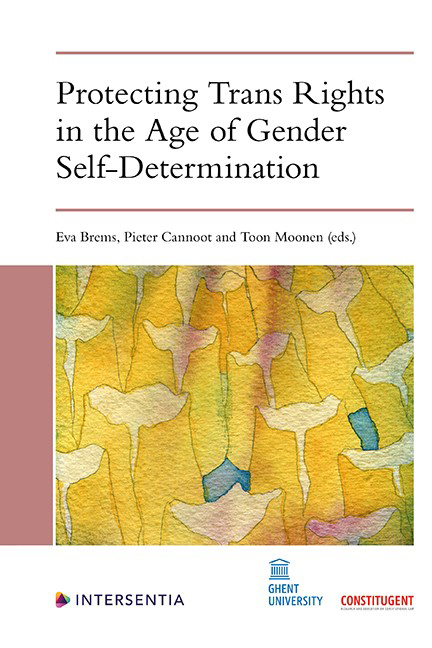Book contents
- Frontmatter
- Contents
- List of Cases
- List of Authors
- Introduction
- The Limits to Gender Self-Determination in a Stereotyped Legal System: Lessons from the Belgian Gender Recognition Act
- From Assigning Sex to Affirming Gender: Remarks on an Ongoing Evolution Affecting Gender Identification
- The Insufficiency of Gender Recognition Acts: The Example of Schooldays in Norway
- Developments in German Civil Status Law on the Recognition of Intersex and Non-Binary Persons: Subversion Subverted
- Framing Equality: Debating Protected Grounds in the Field of Trans and Non-Binary Rights
- ‘True Sex’: The Law and Confirmation of One’s Sex
- Index
- About the Editors
Introduction
Published online by Cambridge University Press: 11 February 2021
- Frontmatter
- Contents
- List of Cases
- List of Authors
- Introduction
- The Limits to Gender Self-Determination in a Stereotyped Legal System: Lessons from the Belgian Gender Recognition Act
- From Assigning Sex to Affirming Gender: Remarks on an Ongoing Evolution Affecting Gender Identification
- The Insufficiency of Gender Recognition Acts: The Example of Schooldays in Norway
- Developments in German Civil Status Law on the Recognition of Intersex and Non-Binary Persons: Subversion Subverted
- Framing Equality: Debating Protected Grounds in the Field of Trans and Non-Binary Rights
- ‘True Sex’: The Law and Confirmation of One’s Sex
- Index
- About the Editors
Summary
GENDER VARIATION AS A HUMAN RIGHTS ISSUE
In recent years, trans issues have made their way into mainstream media, with positive representations of trans persons increasingly appearing in popular culture. Cultural awareness and social recognition of many forms of gender roles, gender identity and gender expression have continued to progress around the globe. Besides, the so-called ‘trans taboo’ seems to be diminishing, as more people find their way to care programmes. Over the last decade, trans rights and gender variation as a legal and human rights issue have also been high on the agenda, both at the international and national level. Indeed, the improved registration of and attention for the prevalence of gender variation and gender incongruence is accompanied by the legal attention for the ofter far-reaching requirements trans persons have to comply with in order to obtain legal recognition of their actual gender identity. In many countries worldwide, trans persons have to comply with invasive medical requirements, such as gender affirming surgery, sterilising surgery and/or hormonal treatment, in order to have their officially registered (birth) sex changed in light of their gender identity.
While the increased social recognition of trans persons has mostly resulted in higher acceptance rates of gender incongruence and gender variation, worldwide data show that trans persons still remain among the most vulnerable groups in society. Not only are trans persons ofter subjected to verbal, physical and material violence, their legal status is ofter inferior to that of cisgender persons. However, a small but rapidly growing number of (mostly European and South-American) States have recently reformed their legal framework of legal gender recognition, by allowing trans persons to change their official sex registration on the basis of gender self-determination, i.e. without any medical requirement. Nevertheless, despite the considerable progress over the last decade, the law has arguably remained largely blind to the subtleties of gender identity, and persists in trying to assign individuals legal and social identities that are not their own, based on criteria which themselves are uninformed gendered assumptions and stereotypes. This situation not only denies the individual identity of a considerable group of human beings, but arguably also affects the legitimacy, pertinence and proportionality of government performance that is connected to the registered sex and/or gender identity
- Type
- Chapter
- Information
- Publisher: IntersentiaPrint publication year: 2020

